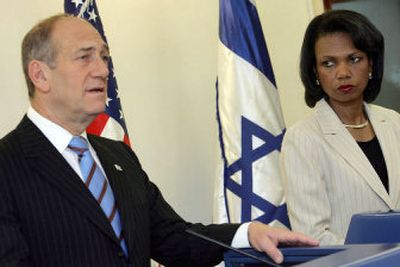U.S. plan for Mideast drawing skepticism

LONDON – U.S. Secretary of State Condoleezza Rice’s calls this week for a deliberate approach to building “a new Middle East” are facing increased skepticism among many of those who ordinarily would be America’s strongest backers in efforts to end the conflict in Lebanon.
U.S. allies in Europe and the Arab world are warning that without Washington’s endorsement of an immediate cease-fire in Lebanon, escalating violence could eclipse any hope to transform a region beset by autocracy and terrorism to one founded on freedom and democracy.
European and Arab allies are particularly skeptical about Washington’s reassurances that the violence in Iraq – and now Lebanon – herald the end of an old, totalitarian status quo in favor of a new, more democratic Middle East. While supportive of America’s calls for democracy in the region, they doubt that going to war with Hezbollah will advance that goal.
The immediate focus of those misgivings falls on the timing of a cease-fire.
“Now more than ever, we call for moderation, with the goal of a cessation of hostilities that are provoking enormous damage and a humanitarian tragedy,” said Massimo d’Alema, foreign minister of Italy, which today will host a meeting of leaders from North America, Europe and the United Nations in an attempt to broker a resolution to the crisis.
Britain has continued to back Bush’s call for a “sustainable,” if not immediate, cease-fire, and supported Israel’s right to guarantee security on its borders. France, which initially called for a rapid cease-fire and condemned Israel’s campaign as “totally disproportionate,” in recent days has eased closer to the U.S. position, blaming Syria and Iran for inciting Hezbollah.
But Italy and Spain have pointedly criticized America’s failure to halt the bloodletting. Spanish Prime Minister Jose Luis Rodriguez Zapatero, whose Socialist government has had testy relations with Washington since coming to power a little more than a year ago, has also been critical of “abusive” force in the region, an allusion to Israel.
“The silences of today in light of what is happening in the Mideast could become the regrets of tomorrow, because waiting for time to pass costs human lives,” Zapatero said.
Germany, while recognizing Israel’s right to defend itself, warned that Lebanon could be “further destabilized” under a prolonged bombing campaign.
Perhaps more worrisome for Washington, America’s two strongest allies in the Arab world, Saudi Arabia and Egypt – each of whom had generally sided with Washington as the conflict began – on Tuesday expressed strong misgivings over the severity of the Israeli airstrikes and echoed European calls for a speedy end to the crisis.
In an apparent reference to Rice’s description of the turbulent “birth pangs” of a “new Middle East,” Egyptian President Hosni Mubarak called for an immediate cease-fire and warned that “what is happening in the region is destructive chaos, not creative chaos.”
Saudi Arabian King Abdullah went further, warning that “no one can predict what will happen if things get out of control” in Lebanon.
“Saudi Arabia warns everybody that if the peace option fails because of Israeli arrogance, there will be no other option but war,” the king said in a statement, adding that “patience cannot last forever.”
“There’s a lot of frustration about the (tactic) the Americans have been taking, letting Israel destroy a country just to take out a militia,” said a Saudi government adviser, who spoke on condition of anonymity. “America is doing a disservice to everyone by not reining in the Israelis.”
Washington’s best Arab allies are entrenched, undemocratic regimes whose leaders support the Bush administration in Lebanon in part because they fear that the popular Islamic activism embodied in Hezbollah and Hamas could turn against them at home. Those regimes now worry that the popular perception that the United States is standing behind Israel will undermine their credibility at home and invite new militancy.
Ironically, France – which led European opposition to the U.S.-led war in Iraq – now looks to be almost allied with the U.S. over Lebanon.
President Jacques Chirac had expressed great concern about the destruction wrought by the Israeli bombardment and called for an immediate cease-fire. But he recently tempered that criticism of Israel with rebukes of Hezbollah that have hardened over time, narrowing the distance between French and U.S. viewpoints.